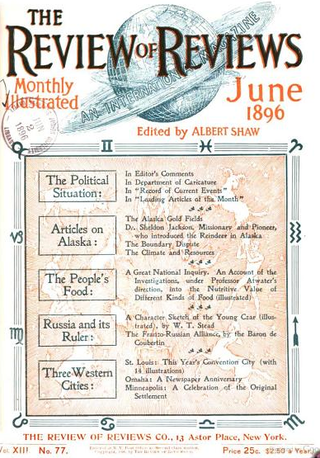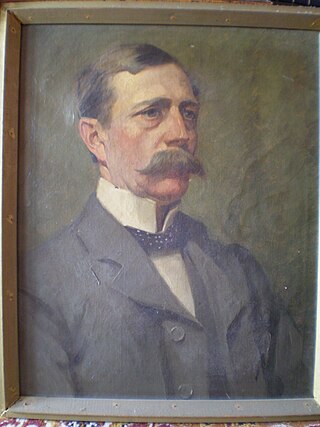
Paul Charles Joseph Bourget was a French poet, novelist and critic. He was nominated for the Nobel Prize in Literature five times.

Mathilde Blind, was a German-born English poet, fiction writer, biographer, essayist and critic. In the early 1870s she emerged as a pioneering female aesthete in a mostly male community of artists and writers. By the late 1880s she had become prominent among New Woman writers such as Vernon Lee, Amy Levy, Mona Caird, Olive Schreiner, Rosamund Marriott Watson, and Katharine Tynan. She was praised by Algernon Charles Swinburne, William Michael Rossetti, Amy Levy, Edith Nesbit, Arthur Symons and Arnold Bennett. Her much-discussed poem The Ascent of Man presents a distinctly feminist response to the Darwinian theory of evolution.

Samuel Rutherford Crockett, who published under the name "S. R. Crockett", was a Scottish novelist.
The Irish Literary Revival was a flowering of Irish literary talent in the late 19th and early 20th century. It includes works of poetry, music, art, and literature.

Amy Judith Levy was an English essayist, poet, and novelist best remembered for her literary gifts; her experience as the second Jewish woman at Cambridge University, and as the first Jewish student at Newnham College, Cambridge; her feminist positions; her friendships with others living what came later to be called a "New Woman" life, some of whom were lesbians; and her relationships with both women and men in literary and politically activist circles in London during the 1880s.
Henry Colburn was a British publisher.

Alexander McPhee Miller is an Australian novelist. Miller is twice winner of the Miles Franklin Award, in 1993 for The Ancestor Game and in 2003 for Journey to the Stone Country. He won the overall award for the Commonwealth Writer's Prize for The Ancestor Game in 1993. He is twice winner of the New South Wales Premier's Literary Awards Christina Stead Prize for Conditions of Faith in 2001 and for Lovesong in 2011. In recognition of his impressive body of work and in particular for his novel Autumn Laing he was awarded the Melbourne Prize for Literature in 2012.

The Review of Reviews was a noted family of monthly journals founded in 1890–1893 by British reform journalist William Thomas Stead (1849–1912). Established across three continents in London (1891), New York (1892) and Melbourne (1893), the Review of Reviews, American Review of Reviews and Australasian Review of Reviews represented Stead's dream of a global publishing empire.

Scribner's Magazine was an American periodical published by the publishing house of Charles Scribner's Sons from January 1887 to May 1939. Scribner's Magazine was the second magazine out of the Scribner's firm, after the publication of Scribner's Monthly. Charles Scribner's Sons spent over $500,000 setting up the magazine, to compete with the already successful Harper's Monthly and The Atlantic Monthly. Scribner's Magazine was launched in 1887, and was the first of any magazine to introduce color illustrations. The magazine ceased publication in 1939.

George William MacArthur Reynolds was a British fiction writer and journalist.

T. Fisher Unwin was the London publishing house founded by Thomas Fisher Unwin, husband of British Liberal politician Jane Cobden in 1882.

Bernard Edward Joseph Capes was an English author.

This is a bibliography of works by Mary Shelley, the British novelist, short story writer, dramatist, essayist, biographer, and travel writer, best known for her Gothic novel Frankenstein: or, The Modern Prometheus (1818). She also edited and promoted the works of her husband, the Romantic poet and philosopher Percy Bysshe Shelley. Until the 1970s, Mary Shelley was known mainly for her efforts to publish Percy Shelley's works and for Frankenstein. Recent scholarship has yielded a more comprehensive view of Mary Shelley’s achievements, however. Scholars have shown increasing interest in her literary output, particularly in her novels, which include the historical novels Valperga (1823) and Perkin Warbeck (1830), the apocalyptic novel The Last Man (1826), and her final two novels, Lodore (1835) and Falkner (1837). Studies of her lesser-known works such as the travel book Rambles in Germany and Italy (1844) and the biographical articles for Dionysius Lardner's Cabinet Cyclopaedia (1829–46) support the growing view that Mary Shelley remained a political radical throughout her life. Mary Shelley's works often argue that cooperation and sympathy, particularly as practised by women in the family, were the ways to reform civil society. This view was a direct challenge to the individualistic Romantic ethos promoted by Percy Shelley and Enlightenment political theories.
Wales was an English-language literary journal, published from 1937 to 1949 and from 1958 to 1960. The magazine contained fiction, poetry, reviews and articles pertaining to Wales.

Samhain was a theatrical periodical published irregularly, with an annual in December. The Irish poet W. B. Yeats was a regular and leading contributor of essays outlining his artistic principles. It existed between 1901 and 1908.

The English Review was an English-language literary magazine published in London from 1908 to 1937. At its peak, the journal published some of the leading writers of its day.

Tales of Unrest is a collection of five works of short fiction by Polish-British author Joseph Conrad. Four of the five works were previously published as serials in literary journals before appearing in the volume, published in 1898 by T. Fisher Unwin.

Heather Rose is an Australian author born in Hobart, Tasmania. She is the author of the acclaimed memoir Nothing Bad Ever Happens Here. She is best known for her novels The Museum of Modern Love, which won the 2017 Stella Prize, and Bruny (2019), which won Best General Fiction in the 2020 Australian Book Industry Awards. She has also worked in advertising, business, and the arts.

Poems and Songs of Middle Earth is a studio album of spoken-word poetry by the English author J. R. R. Tolkien and art songs composed by the English musician Donald Swann. On the first half of the album, Tolkien recites seven poems from or related to his fantasy novel The Lord of the Rings (1954–55). The second half is a performance of Swann's song cycle The Road Goes Ever On, which sets selections from Tolkien's verse to music. The vocalist William Elvin sings The Road Goes Ever On to Swann's piano accompaniment. Caedmon Records issued the album on 18 October 1967 in the United States, and then on 28 March 1968 in the United Kingdom. Its release coincided with the publication of The Road Goes Ever On as a book of sheet music with commentary and illustration by Tolkien.
















